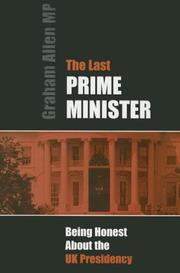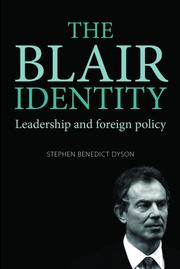| Listing 1 - 10 of 25 | << page >> |
Sort by
|
Book
ISBN: 1400878268 0691075123 069162688X 9781400878260 9780691075129 9780691626888 0691653054 Year: 2015 Publisher: Princeton, NJ
Abstract | Keywords | Export | Availability | Bookmark
 Loading...
Loading...Choose an application
- Reference Manager
- EndNote
- RefWorks (Direct export to RefWorks)
Starting with an illuminating historical survey, Mr. Carter devotes the main portion of his hook to the position of the British Prime Minister since 1894, with emphasis on the realities of British politics today. The relations of the Prime Minister with the public, his party, the Cabinet, and Parliament are discussed, and the problem of public relations generally is fully taken into account. Professor Carter fills an important gap, and provides an authoritative and readable commentary on British political life.Originally published in 1955.The Princeton Legacy Library uses the latest print-on-demand technology to again make available previously out-of-print books from the distinguished backlist of Princeton University Press. These editions preserve the original texts of these important books while presenting them in durable paperback and hardcover editions. The goal of the Princeton Legacy Library is to vastly increase access to the rich scholarly heritage found in the thousands of books published by Princeton University Press since its founding in 1905.
Great Britain. --- Prime Minister of Britain --- Prime ministers

ISBN: 1845406095 9781845406097 9780907845416 Year: 2017 Publisher: [United Kingdom]
Abstract | Keywords | Export | Availability | Bookmark
 Loading...
Loading...Choose an application
- Reference Manager
- EndNote
- RefWorks (Direct export to RefWorks)
Prime ministers --- Great Britain. --- Prime Minister of Britain --- Great Britain --- Politics and government
Book
Year: 1966 Publisher: London : Oxford university press,
Abstract | Keywords | Export | Availability | Bookmark
 Loading...
Loading...Choose an application
- Reference Manager
- EndNote
- RefWorks (Direct export to RefWorks)
India (Republic) Prime Minister. --- Shastri, Lal Bahadur, --- Gandhi, Indira, --- India --- Politics and government
Book
Year: 1966 Publisher: London,Toronto : Oxford U.P.,
Abstract | Keywords | Export | Availability | Bookmark
 Loading...
Loading...Choose an application
- Reference Manager
- EndNote
- RefWorks (Direct export to RefWorks)
India (Republic) Prime Minister --- Shastri, Lal Bahadur, --- Gandhi, Indira, --- India --- Inde --- Politics and government --- Politique et gouvernement
Book
ISBN: 9781780765822 1780765827 9781780765815 Year: 2014 Publisher: London I.B. Tauris
Abstract | Keywords | Export | Availability | Bookmark
 Loading...
Loading...Choose an application
- Reference Manager
- EndNote
- RefWorks (Direct export to RefWorks)
Book
Year: 2016 Publisher: Institute for Local Self-Government and Public Procurement Maribor
Abstract | Keywords | Export | Availability | Bookmark
 Loading...
Loading...Choose an application
- Reference Manager
- EndNote
- RefWorks (Direct export to RefWorks)
This paper deals with the position and the powers of head of state in the legislative and the executive branch in former socialist systems. It examines the system in countries that emerged from socialist regimes, where the parliamentary system and the function of the President of the Republic as the individual head of state were introduced in the 1990s, namely in 10 (newest) Member States of the European Union. The paper elaborates on the position of the President of the Republic, the extent of the office’s powers, and the resulting cooperation between the office of the President, the executive and legislative bodies, which is also one of the fundamental criteria of the standard classification of political regimes. The powers of the President in the field of legislation are the powers based on which the relationship between the President of the Republic and the legislative authority is established. The analyzed powers that the President exercises vis-à-vis the parliament are the powers of the President in relation to the adoption of an Act, the powers that the President of the Republic has in the domain of announcing parliamentary elections and convening a parliamentary sitting, as well as the powers in the domain of dissolving the parliament and announcing early elections. In the second part the paper focuses on the relationship between the President of the Republic and the government, and, consequently, the President's powers in the formation of the government and the appointing of state officials.
legislative --- head of the state --- systems --- socialist systems --- executive branch --- Czech Republic --- Dissolution of parliament --- Dubrovnik --- Estonia --- Motion of no confidence --- Planned economy --- Prime minister --- Veto

ISBN: 1781702179 1847792901 9781847792907 9781781702178 9780719079993 0719079993 Year: 2009 Publisher: Manchester ; New York : Manchester University Press,
Abstract | Keywords | Export | Availability | Bookmark
 Loading...
Loading...Choose an application
- Reference Manager
- EndNote
- RefWorks (Direct export to RefWorks)
Why did Tony Blair take Britain to war with Iraq? Because, this book argues, he was following the core political beliefs and style - the Blair identity - manifest and consistent throughout his decade in power. Kosovo, Sierra Leone, Afghanistan, and finally Iraq were wars to which Blair was drawn due to his black-and-white framing of the world, his overwhelming confidence that he could shape events, and his tightly-held, presidential style of government. In this new application of political psychology to the British prime ministership, Dyson analyses every answer Blair gave to a foreign policy
Political leadership. --- Leadership --- Blair, Tony, --- Political and social views. --- Psychology. --- Great Britain --- Foreign relations --- Blair, Tony --- British foreign policy. --- British prime ministership. --- House of Commons. --- Tony Blair. --- decade in power. --- decision maker. --- political psychology. --- politics. --- prime minister. --- war with Iraq.
Book
ISSN: 14769107 ISBN: 1283620251 9786613932709 1846158532 1843836300 Year: 2011 Volume: v. 11 Publisher: Woodbridge [England] ; Rochester, N.Y. : Boydell Press,
Abstract | Keywords | Export | Availability | Bookmark
 Loading...
Loading...Choose an application
- Reference Manager
- EndNote
- RefWorks (Direct export to RefWorks)
A new assessment of the life and political career of Lord Shelburne, prime minister 1782-83, and of the context in which he lived. Although Lord Shelburne was prime minister for only a short period, 1782-83 - but a key period in which peace with the newly-independent United States was concluded - he was an extremely interesting politician, a supporter of the crown, but also connected to continental philosophers and intellectuals. Lord Shelburne, Prime Minister in 1782-83, was a profoundly important politician, whose achievements included the negotiation of the peace with the newly-independent United States. This book constitutes a major and long overdue reappraisal of the politician considered by Disraeli to be the 'most neglected Prime Minister'. The book indicates, caters for, and leads the revival of interest in high politics, including its gendered aspects. It covers Shelburne's friends, his finances, and his politics, and places him carefully within both an international and a national context. For the first time his complicated but compelling family life, his satisfying relations with women, and his Irish ancestry are presented as essential factors for understanding his public impact overall. Shelburne was a politician, patron, and cultural leader whose relationship to many of the ideas, influences, and individuals of the European Enlightenment are also emphasised. The book is thoroughly up to date, written by leading authorities in the field, and predominantly based on unpublished primary research. Shelburne and his circle constituted one of the most important [and progressive] elements in British and European politics during the second half of the eighteenth century, and the book will appeal to all readers interested in the Enlightenment. NIGEL ASTON is Reader in Early Modern History in the School of Historical Studies at the University of Leicester; CLARISSA CAMPBELL ORR is Reader in Enlightenment, Gender and Court Studies at Anglia Ruskin University.
Lansdowne, William Petty, --- Petty, William, --- Shelburne, William Petty, --- United States --- Great Britain --- History --- Colonies --- History. --- England --- HISTORY / Modern / General. --- British and European Politics. --- Great Reform Act. --- Lord Shelburne. --- Prime Minister. --- Whig Britain.
Book
ISBN: 176046497X 1760464961 Year: 2021 Publisher: Canberra ANU Press
Abstract | Keywords | Export | Availability | Bookmark
 Loading...
Loading...Choose an application
- Reference Manager
- EndNote
- RefWorks (Direct export to RefWorks)
The question of how to maintain the continuity of diplomacy while developing democracy without military intervention is an old and new issue. The challenge can be described as a dilemma between democracy and diplomatic coherence.
Asian history --- Postwar 20th century history, from c 1945 to c 2000 --- Military history --- International relations --- Diplomacy --- constitution --- War --- diplomacy --- Prime Minister --- Japan --- Shidehara, Kijūrō, --- Foreign relations --- 幣原喜重郎
Book
Year: 2016 Publisher: Institute for Local Self-Government and Public Procurement Maribor
Abstract | Keywords | Export | Availability | Bookmark
 Loading...
Loading...Choose an application
- Reference Manager
- EndNote
- RefWorks (Direct export to RefWorks)
This paper deals with the position and the powers of head of state in the legislative and the executive branch in former socialist systems. It examines the system in countries that emerged from socialist regimes, where the parliamentary system and the function of the President of the Republic as the individual head of state were introduced in the 1990s, namely in 10 (newest) Member States of the European Union. The paper elaborates on the position of the President of the Republic, the extent of the office’s powers, and the resulting cooperation between the office of the President, the executive and legislative bodies, which is also one of the fundamental criteria of the standard classification of political regimes. The powers of the President in the field of legislation are the powers based on which the relationship between the President of the Republic and the legislative authority is established. The analyzed powers that the President exercises vis-à-vis the parliament are the powers of the President in relation to the adoption of an Act, the powers that the President of the Republic has in the domain of announcing parliamentary elections and convening a parliamentary sitting, as well as the powers in the domain of dissolving the parliament and announcing early elections. In the second part the paper focuses on the relationship between the President of the Republic and the government, and, consequently, the President's powers in the formation of the government and the appointing of state officials.
Political structure and processes. --- Politics and government. --- Society and social sciences Society and social sciences. --- legislative --- head of the state --- systems --- socialist systems --- executive branch --- Czech Republic --- Dissolution of parliament --- Dubrovnik --- Estonia --- Motion of no confidence --- Planned economy --- Prime minister --- Veto --- legislative --- head of the state --- systems --- socialist systems --- executive branch --- Czech Republic --- Dissolution of parliament --- Dubrovnik --- Estonia --- Motion of no confidence --- Planned economy --- Prime minister --- Veto
| Listing 1 - 10 of 25 | << page >> |
Sort by
|

 Search
Search Feedback
Feedback About UniCat
About UniCat  Help
Help News
News